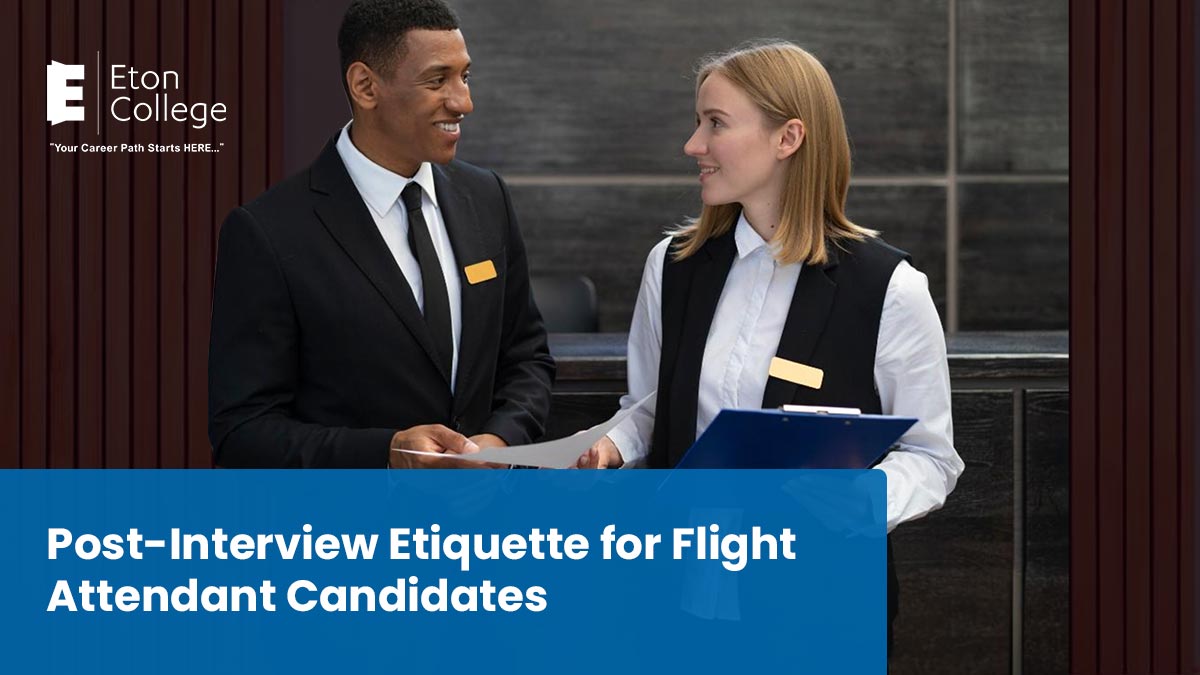- A thank-you note sent within 24-48 hours after your flight attendant interview shows gratitude and keeps you top of mind for recruiters.
- Waiting one to two weeks after the flight attendant interview to follow up respectfully demonstrates your interest without being aggressive.
- Evaluating your performance helps you identify strengths and areas for improvement, preparing you for future flight attendant interview opportunities.
- Ensure your social media presence reflects professionalism, as recruiters may review your online profiles after the flight attendant interview.
- Preparing for second interviews, background checks, or assessments keeps you one step ahead in the hiring process.
You’ve successfully navigated your flight attendant interview, answering questions confidently, showcasing your skills, and making a great first impression. But the interview process doesn’t end when you walk out of the room. Your post-interview etiquette plays a critical role in leaving a lasting impression on recruiters and could influence your chances of getting hired.
Related:Mock Flight Attendant Interviews: How to Practice for Success
In this blog, we’ll walk you through essential post-interview etiquette tips for flight attendant candidates, helping you stand out even after the flight attendant interview has ended.
1. Send a Thank-You Note
One of the most important steps after any interview, especially a flight attendant interview, is sending a thank-you note to the recruiter or hiring team. This simple gesture shows that you appreciate the opportunity and are still enthusiastic about the role.
When to Send the Thank-You Note:
- Send your thank-you note within 24-48 hours after the flight attendant interview. This ensures that the hiring team remembers you while the interview is still fresh in their minds.
What to Include:
- Express gratitude for the opportunity.
- Mention specific aspects of the flight attendant interview that stood out to you, such as a conversation about the airline’s culture or a question about safety procedures.
- Reaffirm your interest in the role, and emphasize how your skills align with the airline’s requirements.
- Keep it concise and professional.
Related:20 Common Flight Attendant Interview Questions
2. Follow Up Without Being Pushy
While it’s natural to want to hear back about the status of your application after your flight attendant interview, it’s important to follow up in a professional and respectful manner. Recruiters often need time to make their decisions, and an overly aggressive follow-up can hurt your chances.
When to Follow Up:
- If the recruiter provided a timeline during the flight attendant interview, wait until after that period to send a follow-up email. If no timeline was given, waiting one to two weeks is a good rule of thumb.
- Use your follow-up to reiterate your interest in the role and inquire politely about the status of the application process.
What to Avoid:
- Don’t send multiple follow-up emails if you don’t get an immediate response. Patience is key.
- Avoid calling the recruiter or showing up unannounced at the office. Email is the most appropriate medium for follow-up communication.
Related:How to Answer Behavioral Interview Questions for Flight Attendant
3. Reflect on the Interview Experience
After the flight attendant interview, take some time to reflect on the experience. This is an opportunity for you to evaluate how well you think you did and identify areas for improvement in future interviews.
Questions to Ask Yourself:
- What went well during the flight attendant interview? Did you answer questions confidently and clearly?
- Were there any questions you struggled with or didn’t answer as thoroughly as you would have liked?
- Did you present yourself professionally in terms of both your communication and appearance?
- How did you interact with the interview panel? Did you engage with the interviewers in a friendly, approachable way, much like a flight attendant would interact with passengers?
Reflecting on these questions will help you prepare for future interviews and fine-tune your approach. Even if you don’t get the job, this kind of reflection can help you grow and perform better in subsequent flight attendant interview scenarios.
Related:Pack for Success: Key Essentials for Your Flight Attendant Interview
4. Maintain Professionalism on Social Media
In today’s digital world, many employers look at a candidate’s social media presence as part of the hiring process. After your flight attendant interview, it’s essential to maintain a professional image online.
What to Do:
- Review your social media accounts and ensure that your public profiles reflect the professional image you want to project.
- If you mentioned any social media activities during the flight attendant interview, such as LinkedIn, make sure your profile is up to date and accurately represents your experience and skills.
- Avoid posting any negative comments about the interview process, recruiters, or the airline itself. Even a private comment could end up being seen by the wrong person.
What to Avoid:
- Don’t post anything that might raise red flags for recruiters, such as inappropriate photos, controversial opinions, or unprofessional comments.
- Avoid sharing sensitive information about the flight attendant interview, such as specific questions asked or details about the hiring process. Maintain discretion at all times.
5. Prepare for the Next Steps
While you’re waiting to hear back from the airline, it’s a good idea to stay prepared for any next steps in the hiring process. If the airline offers a second round of interviews, background checks, or pre-employment assessments, you’ll want to be ready.
What to Do:
- Review any materials or information that were shared during the flight attendant interview. This will help you stay fresh on the company’s policies, procedures, and expectations.
- Keep practicing your interview skills. If you didn’t perform as well as you’d hoped in certain areas, take the time to work on them before your next flight attendant interview.
- Stay positive and be patient. The interview process for a flight attendant position can take time, but staying focused on your goals will keep you motivated.
Related:Dress Code and Appearance Tips for a Flight Attendant Interview
6. Stay Positive, Even If You Don’t Get the Job
Not every flight attendant interview will result in a job offer, and that’s okay. If you don’t get the position, don’t let it discourage you. Use the experience to grow, learn, and improve for the next opportunity.
How to Handle Rejection Professionally:
- Respond to the rejection email with gratitude, thanking the interviewer for their time and the opportunity. Keep the door open for future positions with the airline.
- Reflect on the feedback (if provided) and use it as a learning opportunity to improve in future flight attendant interview scenarios.
Remember, the flight attendant job market can be competitive, and persistence is key. The more interviews you attend, the better your chances of landing your dream job.
Elevate Your Interview Success
Preparing for a flight attendant interview and mastering post-interview etiquette are crucial steps in securing your dream job in the aviation industry. For those looking to enhance their skills and increase their chances of success, Eton College offers a Flight Attendant Preparation Program that provides essential training in customer service, communication, and airline procedures. With the right guidance and preparation, you’ll be one step closer to soaring in your career as a flight attendant.




